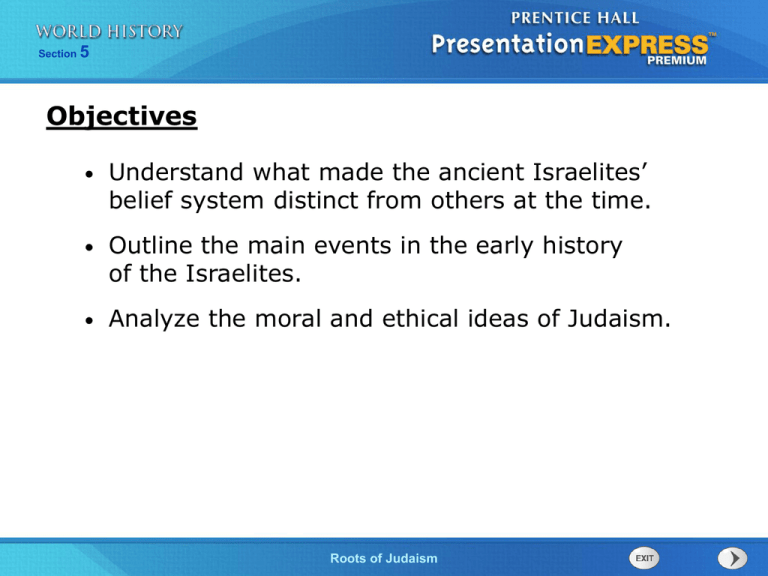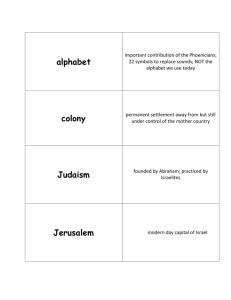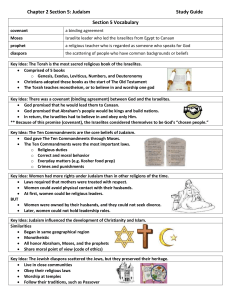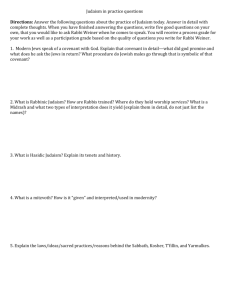Presentation
advertisement

Section 5 Objectives • Understand what made the ancient Israelites’ belief system distinct from others at the time. • Outline the main events in the early history of the Israelites. • Analyze the moral and ethical ideas of Judaism. Roots of Judaism Section 5 Terms and People • monotheistic – believing in one god • Torah – the most sacred Jewish text; includes the first five books of the Hebrew Bible • Abraham – according to the Torah, man considered the father of the Israelite people • covenant – a promise and agreement • Moses – according to the Torah, the Israelite believed to have led the Israelites’ exodus from Egypt Roots of Judaism Section 5 Terms and People (continued) • David – the second king of Israel, who united the 12 tribes into a single nation • Solomon – son of David, a king known for his wisdom and judgment • patriarchal – relating to a society where men hold the greatest legal and moral authority • Sabbath – a holy day for rest and worship • prophet – a spiritual leader who interprets God’s will Roots of Judaism Section 5 Terms and People (continued) • ethics – moral standards of behavior • Diaspora – the spreading out to new regions of the Jewish people that began with the Babylonian captivity Roots of Judaism Section 5 How did the worship of only one god shape Judaism? The present-day nation of Israel lies on the eastern coast of the Mediterranean Sea. About 4,000 years ago, the ancient Israelites developed the religion of Judaism, which became a defining feature of their culture. Today, Judaism is one of the world’s major faiths. Roots of Judaism Section 5 The ancient Israelites, or Hebrews, established the first monotheistic religion. They believed in one all-knowing, all-powerful God who was present everywhere. In their view, each event in history represented part of God’s plan for the people of Israel. All of these events and the laws were recorded in the Torah, the first five books of the Hebrew Bible. Roots of Judaism Section 5 The oldest surviving texts of the Hebrew Bible were found in a set of caves in 1947. The 2000 yearold Dead Sea Scrolls were printed on papyrus and had been stored in clay jars. The caves of Qumran, where the scrolls were found. Roots of Judaism Section 5 The Bible says that Moses renewed the Israelites’ covenant with God. Famine had forced them to leave Canaan and live in Egypt, where they were enslaved. According to the Book of Exodus, Moses told the Jews that God was rewarding their faithful obedience. He led them out of Egypt, and for 40 years they roamed the deserts of Canaan. Roots of Judaism Section 5 About 1000 B.C. King David united 12 feuding Jewish tribes and established Israel. His son, King Solomon, sought to build Jerusalem into an impressive capital. • Solomon completed a temple dedicated to God that was begun by David. • He became famous for his wisdom and understanding. • He negotiated with powerful empires in Egypt and Mesopotamia. Roots of Judaism Section 5 Israel declined after Solomon’s death in 922 B.C. Southern Israel split off and became Judah. 722 B.C.—the Assyrians captured Israel. 589 B.C.—Babylon captured Judah. 539 B.C.—Persia freed the Israelites. King Nebuchadnezzar of Babylon forced many into exile and destroyed the temple during the time called the Babylonian Captivity. Roots of Judaism Section 5 Judaism focused on law and morality. The Torah is sometimes called the Books of the Law. It deals with matters from cleanliness to crime, and establishes moral principles. Israelite society was patriarchal. The oldest male was the head of the household. He arranged marriages for his daughters. Roots of Judaism Section 5 Judaism taught an ethical world view. Morality was guided by the Ten Commandments. The first four outlined religious duties to God, such as reserving a holy day for rest and worship. The rest outlined behavior toward others. They include “Honor your father and mother” and “You shall not kill.” Roots of Judaism Section 5 Spiritual leaders such as Isaiah and Jeremiah periodically emerged. • These prophets taught a strong code of moral ethics or personal standards of behavior. • They urged civil justice, teaching that all people were equal before God. • The rich and powerful were called upon to protect the weak. Unlike other ancient societies, the Jews saw their leaders as human and equally bound by all of God’s laws. Roots of Judaism Section 5 For 500 years, beginning with the Babylonian Captivity, Jews were spread throughout the empires that controlled their land. • During this Diaspora, many remained in small communities living by their laws and traditions. • Many faced persecution, but survived and maintained their faith. Judaism’s unique contributions to religious thought heavily influenced the rise of two later monotheistic religions, Islam and Christianity. Roots of Judaism Section 5 Section Review QuickTake Quiz Know It, Show It Quiz Roots of Judaism






